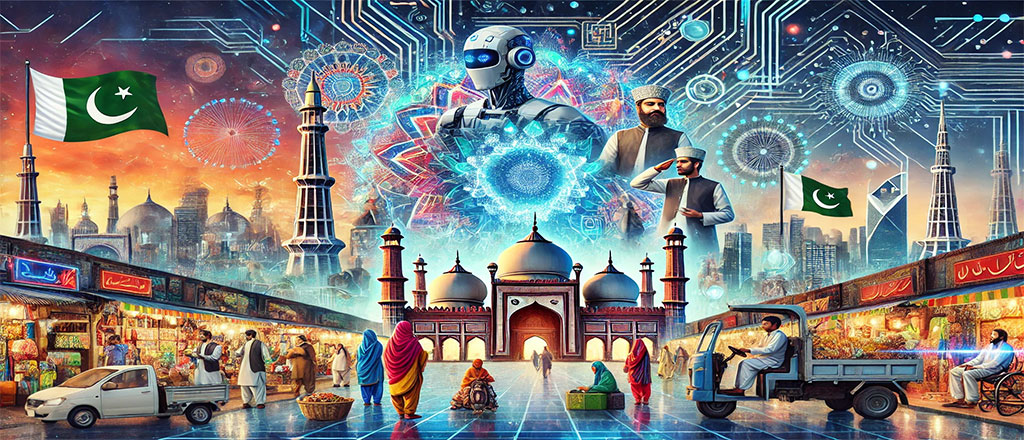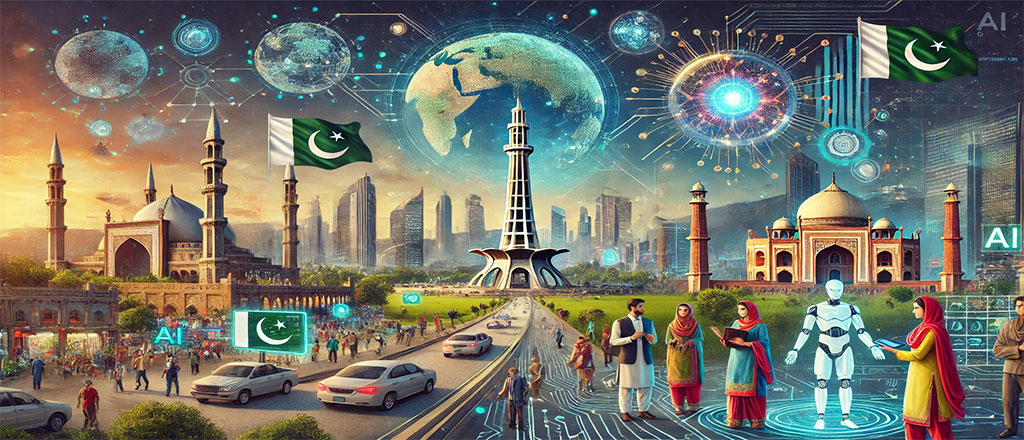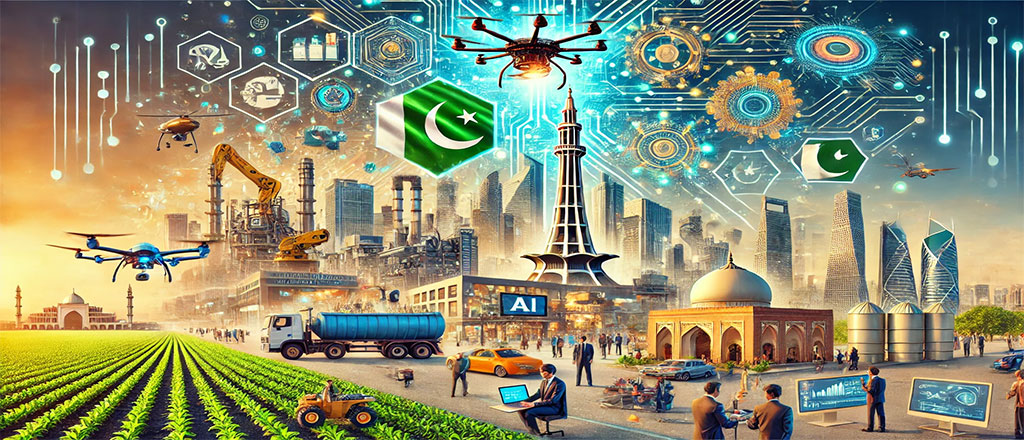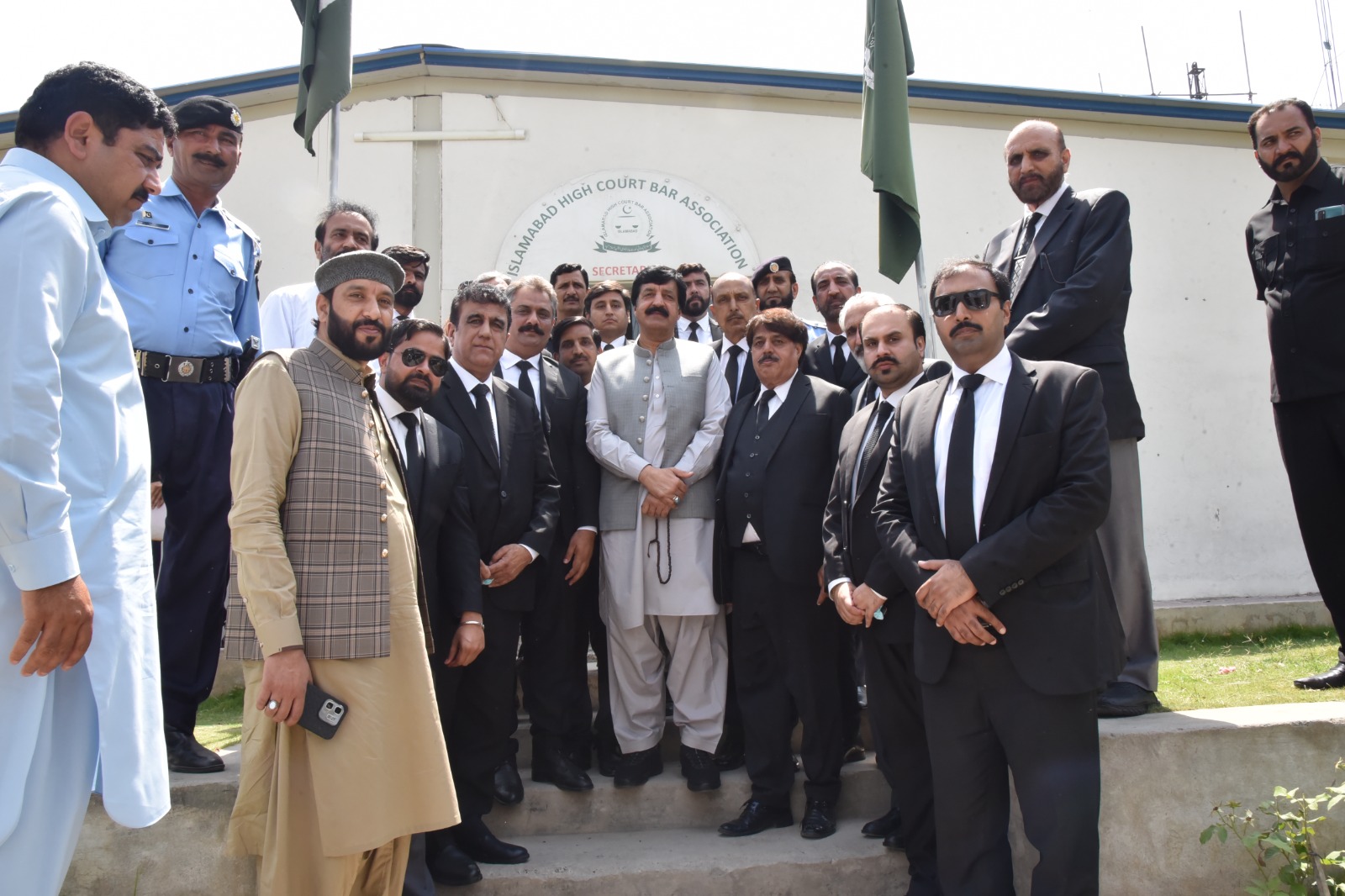Pakistan and Artificial Intelligence

Pakistan and Artificial Intelligence
Technology has significantly enhanced the ease and comfort of human life in the modern era. The rapid evolution of technology has given rise to Artificial Intelligence (AI), a development that has revolutionized various fields, including sports, medicine, academics, and military innovations.
AI has transformed daily tasks, making them more accurate and efficient, although it brings both benefits and potential threats to human life. The advent of AI tools, such as deep fake and audio clone technology, introduces challenges alongside its positive impact.
In Pakistan, there is a gradual adoption of AI in various public and private institutions, with small businesses and industries leveraging AI tools to enhance production efficiency and sales. Moreover, Pakistan has great potential to adopt AI in various fields like manufacturing, education, Security and agriculture to enhance productivity and economic growth.
This article will explore the historical evolution of artificial intelligence and its transformative impact on the world. Additionally, it will delve into the adoption of AI, examining both its advantages and disadvantages. The article will also investigate Pakistan's dedication to incorporating AI and explore its potential implications for the country.
Artificial Intelligence:
Artificial intelligence is the ability of machine or computer program to perform various tasks by replicating human intelligence and problem solving abilities. Generative Artificial intelligence can think and take decisions like humans through absorption of unstructured data like text, Images, videos etc. AI applications includes robotics, Playing games, autonomous vehicles and language translations.
History of Artificial Intelligence:
The ideology of AI is not new although its history is thousand years old. In ancient times scientist invented a machine named as ‘‘Automaton’’, it is a Greek word which means ‘‘acting on its own will’’. Ground work on AI started in early 1900s, in 1921 the word artificial was initially introduced by Czech playwright Karel when he released a fiction drama named ‘‘Rossum’s Universal Robots’’ in which idea of ‘‘artificial people (Robots)’’ were revealed.
The history of artificial intelligence (AI) unfolds over several key periods, starting with its conceptualization by Alan Turing in 1950 and the development of the first checkers-playing program by Arthur Samuel in 1952. John McCarthy's workshop in 1955 marked the introduction of the term "artificial intelligence". The years from 1957 to 1979 witnessed both rapid growth and challenges in AI research, with notable achievements such as John McCarthy's creation of List Processing (LISP) in 1958 and the development of the first expert system by Edward Feigenbaum and Joshua Lederberg in 1965.
The 1980s brought the "AI boom", characterized by breakthroughs like the commercial launch of expert systems and Japan's investment in the Fifth Generation Computer project. However, the decade concluded with the AAAI (Association for the Advancement of Artificial Intelligence) warning of an impending "AI Winter" in 1984, leading to reduced funding and interest in AI research from 1987 to 1993. Despite setbacks, the early 1990s saw advancements like Deep Blue defeating a world chess champion in 1997. The following years brought innovations such as Roomba, speech recognition software, and Mars rovers. The period from 2012 to the present marked the era of Artificial General Intelligence, showcasing breakthroughs in deep learning and notable achievements like Google's Alpha Star reaching Grandmaster in 2019 and Open AI's ChatGPT-3 beta testing in 2020. This timeline underscores the evolution, challenges, and transformative impact of AI over the decades, from its inception to its current state of widespread application in various domains.
Artificial Intelligence Revolutionizing the World:
Artificial intelligence (AI) has become a transformative force, impacting various facets of our lives and industries. From reshaping the landscape of warfare to revolutionizing filmmaking with realistic effects, AI has brought about significant changes. In Japan, a major economic player, robotics and AI is employed to address social issues and contribute to economic growth, even in factory settings where humanoid robots collaborate with human employees. AI has also played a crucial role in global trade recommendations, contributing to rapid economic development. Notably, companies like Amazon utilize AI to enhance customer experiences, exemplified by their AI-powered convenience store in Seattle, eliminating the need for traditional checkouts.
AI success stories, such as Chat-GPT, demonstrate the technology's potential. Media outlets leverage AI for content generation, significantly increasing their output. In healthcare, tools like Deep Patient and Path-AI showcase AI's ability to predict and diagnose diseases early, improving patient outcomes. Major brands like Nike employ AI to enable customers to customize products and gather valuable data for future innovations. Social media platforms like Twitter leverage AI to detect and block content linked to terrorism and hate speech.
Furthermore, AI has permeated the business landscape, with virtual assistants like Ideal streamlining recruitment processes through data analysis and predictive analytics. By transforming diverse data sources into actionable insights, AI facilitates informed decision-making and reduces biases in hiring practices. As we navigate this era of AI integration, its impact on various sectors underscores its potential for continued innovation and positive transformation.
Several initiatives being taken on global level to create interest about learning of coding and machine learning in children. France’s Pope Francis encourages children to learn programing through his ‘‘Code with pope’’ initiative. Through this initiative free online coding education will be provided for 11-15 years of children across Europe, Africa and Latin America. This course consists on 60 hours of basic coding, which provide knowledge of one of famous programing language Python.
Artificial Intelligence in Pakistan:
The government of Pakistan has proactively embraced the challenges and opportunities presented by the Fourth Industrial Revolution. Through initiatives like "Vision 2025," there is a strategic focus on digitalization, fostering public-private partnerships in the IT sector, and aligning educational institutions with the demands of the digital age. E-governance strategies are being implemented to enhance IT infrastructure, facilitating advancements in e-government, e-health, e-education, and e-commerce, thereby promoting stronger connectivity between the government and its citizens. The nation has made strides in integrating AI into business operations, with companies like Daraz, Food Panda, and Careem leading the way. Over the past two decades, Pakistan has launched various projects to meet the increasing technological needs of the country. These include the establishment of special IT zones, the Special Technology Zones Authority (STZA), and the development of software technology parks. The government's commitment extends to improving digital capabilities across diverse industries such as healthcare, education, and agriculture.

In 2018, an initiative was launched under ‘‘Presidential Initiative for Artificial Intelligence and Computing’’ to enhance abilities of Pakistan’s youth in Artificial intelligence and other technologies. This initiative offered several academic courses to develop tech skills of Pakistan’s youth on Artificial intelligence, Block Chain, cloud Native and mobile Web etc. Moreover, the establishment of AI institutes like the Sino-Pak Center for Artificial Intelligence (SPCAI) and the National Center of Artificial Intelligence (NCAI) reflects Pakistan's dedication to leveraging artificial intelligence for solutions in areas like smart cities, smart agriculture, deep learning, and natural disaster management.
Further, approvals by the Higher Education Commission for universities to incorporate AI into their curriculum contribute significantly to building capacity in both the public and private sectors. Overall, Pakistan is actively positioning itself to harness the benefits of emerging technologies and navigate the complexities of the digital era.
Potential of Artificial Intelligence in Pakistan:
The integration of AI into various sectors, particularly finance, healthcare, agriculture, education, and security, holds promising prospects for Pakistan's development. Beyond the potential for increased profits and efficient fund utilization, AI can significantly contribute to risk audit, fraud detection, and enhanced public services. To fully leverage AI's benefits, there is a crucial need for widespread education and awareness among the workforce, including incorporating AI education into college curriculum.
As Pakistan strives to remain competitive, it must foster a culture that promotes efficiency, integrity, and responsible AI use. While embracing AI in governance, it is imperative for the government to make informed decisions about its regulatory oversight, considering whether it falls under the purview of the ministry of information or requires a separate entity.
In specific sectors, AI can demonstrate its transformative impact. In healthcare, AI can help in faster and more accurate diagnoses, while agriculture benefits from AI-powered solutions will optimize crop yields and predicting weather patterns. The finance sector can utilize AI algorithms for fraud detection, risk assessment, and personalized customer experiences.

Moreover, AI can contribute to security systems in Pakistan, enhancing public safety through facial recognition, speech synthesis, and video analytics. The potential of AI extends to public sector organizations, promising improved policymaking, governance, and service delivery. To address challenges in AI adoption, concerted efforts are needed, including investment in training AI professionals, implementing robust cybersecurity measures, and streamlining bureaucratic processes.
As Pakistan navigates its journey to unlock the full potential of AI, collaboration between the government, educational institutions, and the private sector is paramount. Crafting AI policies tailored to specific needs, allocating sufficient budgets, and engaging in international collaboration for knowledge transfer are crucial steps. By addressing these challenges, Pakistan can effectively harness the transformative power of AI, elevating its public services, governance, and overall digital landscape.
How AI can boost Economy of Pakistan:
AI technologies in Pakistan holds tremendous potential for economic growth, innovation, and addressing social and developmental challenges. The emergence of AI-driven industries can lead to the creation of new job opportunities, particularly in specialized fields such as AI development, data analysis, and AI system management. This not only contributes to economic expansion but also enhances the country's human capital by fostering a skilled workforce.
Pakistan has more than 600,000 IT professionals and every year 25,000 fresh IT graduates are added to workforce. Pakistan is providing IT services to more than 170 nations, brought $1.94 billion through exports in 2023, which is expected to reach $3.5 Billion in 2024. Embracing AI in IT sector can positions Pakistan as a player in the global market, paving the way for increased competitiveness and foreign investment. The adoption of AI-powered solutions can drive productivity, innovation, and efficiency in various sectors, giving businesses a competitive edge on the global stage. This, in turn, stimulates entrepreneurship and further solidifies Pakistan's presence in the evolving landscape of the global tech industry.

In the context of generative AI, its positive impact on production and efficiency can be a catalyst for economic expansion. Automation of specialized operations in manufacturing and agriculture, coupled with the potential for job creation in AI-related industries, presents a promising avenue for addressing unemployment challenges in the country.
The strategic integration of AI technologies has the power to drive economic prosperity, foster innovation, and address pressing societal challenges in Pakistan. By harnessing the potential of AI, the country can position itself as a dynamic and forward-thinking player on the global stage, contributing to a more sustainable and inclusive future.
AI and Education:
Artificial Intelligence in education holds immense promise for transforming the learning landscape in Pakistan. Additionally, the tailored use of generative AI in education can enhance learning experiences, potentially improving educational achievements and increasing accessibility to schooling in developing nations like Pakistan. AI's ability to create personalized learning paths, adapt to various learning styles, cater to special needs, and generate high-quality content is reshaping the educational experience for both students and educators.
Pakistani universities and institutions are developing AI projects to enhance their educational capabilities. Recently, COMSATS University Islamabad has launched AI based project to improve higher education systems for the students. This project is also extended to more universities like NUST, UET, NED and Punjab University. Moreover, to develop advance AI technology according to global standards, several research labs will also be established in major cities of Pakistan including Lahore, Peshawar, Islamabad and Karachi.
At college and School level, AI-powered content creation will not only ensure the quality and relevance of educational materials but also reduces the workload for teachers. This enables educators to concentrate on fostering student engagement, addressing individual needs, and facilitating interactive classroom experiences. AI-ready educators bring numerous benefits, including enhanced personalization, improved efficiency through task automation, and the ability to guide students in developing critical thinking skills. As AI technologies continue to evolve, ongoing teacher training ensures educators stay updated and relevant in the rapidly changing educational landscape.
However, several challenges must be addressed to fully harness its potential. The limited access to technology in remote areas, deeply ingrained traditional teaching methods, and a shortage of AI expertise in the education sector pose significant obstacles.
To overcome these challenges, it is imperative to prioritize infrastructure development, ensuring that students across the country have access to the necessary devices and internet connectivity. Moreover, efforts should be directed towards raising awareness among educators, parents, and policymakers about the benefits of AI in education, emphasizing its ability to provide personalized learning experiences and enhance teacher-student interactions.
Additionally, investing in teacher training programs is crucial to equip educators with the necessary skills to integrate AI effectively into their teaching methodologies. This adaptability is essential for staying current with the rapidly evolving field of AI and ensuring that the educational system remains relevant in the face of technological advancements.
By addressing these challenges and fostering a supportive environment for the integration of AI in education, Pakistan can unlock the full potential of this transformative technology, ultimately improving access to quality education and preparing students for the demands of the modern world.
Potential Threats of AI:
Artificial Intelligence (AI) is reshaping various aspects of society, including politics, economies, academia, and the military. While AI tools have the potential to enhance productivity and contribute positively to economic growth, there are significant challenges and risks associated with their widespread use
In politics, the dissemination of misinformation through AI-generated content on social media poses a threat to political trust and stability. Deep fakes, driven by AI, also raise concerns about their potential to mislead masses, fuel religious unrest, and facilitate character assassinations, thereby impacting political systems.
In the context of generative AI, its positive impact on production and efficiency can be a catalyst for economic expansion. Automation of specialized operations in manufacturing and agriculture, coupled with the potential for job creation in AI-related industries, presents a promising avenue for addressing unemployment challenges in the country.
Economically, AI can increase productivity and predict financial crises, as indicated by a Goldman Sachs report foreseeing a 7% increase in global GDP over ten years. However, the rise of AI may lead to job displacement, with estimates suggesting the loss of 85 million jobs by 2025. Although new jobs are expected to emerge, acquiring the necessary skills becomes a crucial challenge. AI's impact on creative professions, such as graphic design, video editing, raises concerns about job category displacement and potential threats to creative industries.
The military domain benefits from AI in surveillance, data gathering, and strategic decision-making, but ethical concerns arise when life-and-death decisions are delegated to machines. Misinformation and cyber warfare in military applications could shift the balance of advantages to disadvantages
AI's implications extend to internet scams, including voice-based scams where cloned audio created by AI tools can mimic original voices with a high degree of accuracy.
Need of AI legislation:
Pakistan continues to embrace the transformative potential of Artificial Intelligence (AI) in various sectors, it is crucial to recognize the need for comprehensive AI legislation. In line with the approach taken for cybersecurity regulation, the government should actively engage AI experts and study the legal frameworks of other countries to develop legislation tailored to the unique challenges and opportunities presented by AI.
Introducing AI legislation will not only provide a structured framework for the ethical and responsible development and deployment of AI technologies but will also establish guidelines for accountability, transparency, and data protection. Given the rapid evolution of AI, involving experts in the drafting process is essential to ensure that the legislation remains adaptive and responsive to emerging challenges.
Furthermore, building a pool of legal experts specializing in AI laws is a proactive step toward fostering a knowledgeable workforce capable of navigating the complexities of the AI sector. These experts can contribute to the ongoing development and refinement of AI legislation, providing valuable insights into the legal implications of AI applications and innovations.
Conclusion
As technology continues to advance, particularly in the realm of Artificial Intelligence (AI), it is imperative for Pakistan to strategically embrace and adapt to these changes. Rather than shying away from AI due to potential risks, the focus should be on smart and responsible utilization. There is a huge potential of AI in education, security, agriculture and health sectors. The adoption of AI in these sector will not only improve efficiency and productivity but also help in rise of economic growth.
Recognizing the need for regulations, it is essential to develop comprehensive frameworks that address the multifaceted aspects of AI. The global community, including Pakistan, should collaborate to establish guidelines that prevent the misuse of AI technology.
A critical aspect of navigating the AI landscape is fostering awareness. Individuals and communities must understand the nuances of AI, and there is a moral obligation to disseminate accurate information. The 2023 AI Index from Stanford University highlights the limited scope of existing regulations globally, emphasizing the necessity for forward-looking measures. Equipping oneself with basic AI knowledge is not only an advantage but, as noted by economist Richard Baldwin, it becomes a safeguard against job displacement. The emphasis should be on striking a balance between innovation and responsible usage, ensuring that AI's benefits are harnessed while mitigating potential risks.
Ovais Ali Khokhar, as Founder and CEO of House of Elaan & Ovaisco Group, has revolutionized the real estate industry with innovative strategies that blend marketing, investment, legal services, and creativity. His efforts in international relations have led to significant global partnerships. He is deeply invested in youth empowerment, aiming to nurture the next generation of leaders and drive forward a resilient and vibrant future. His work is characterized by a strong commitment to collaboration, innovation, and a vision for a globally connected, sustainable future.







